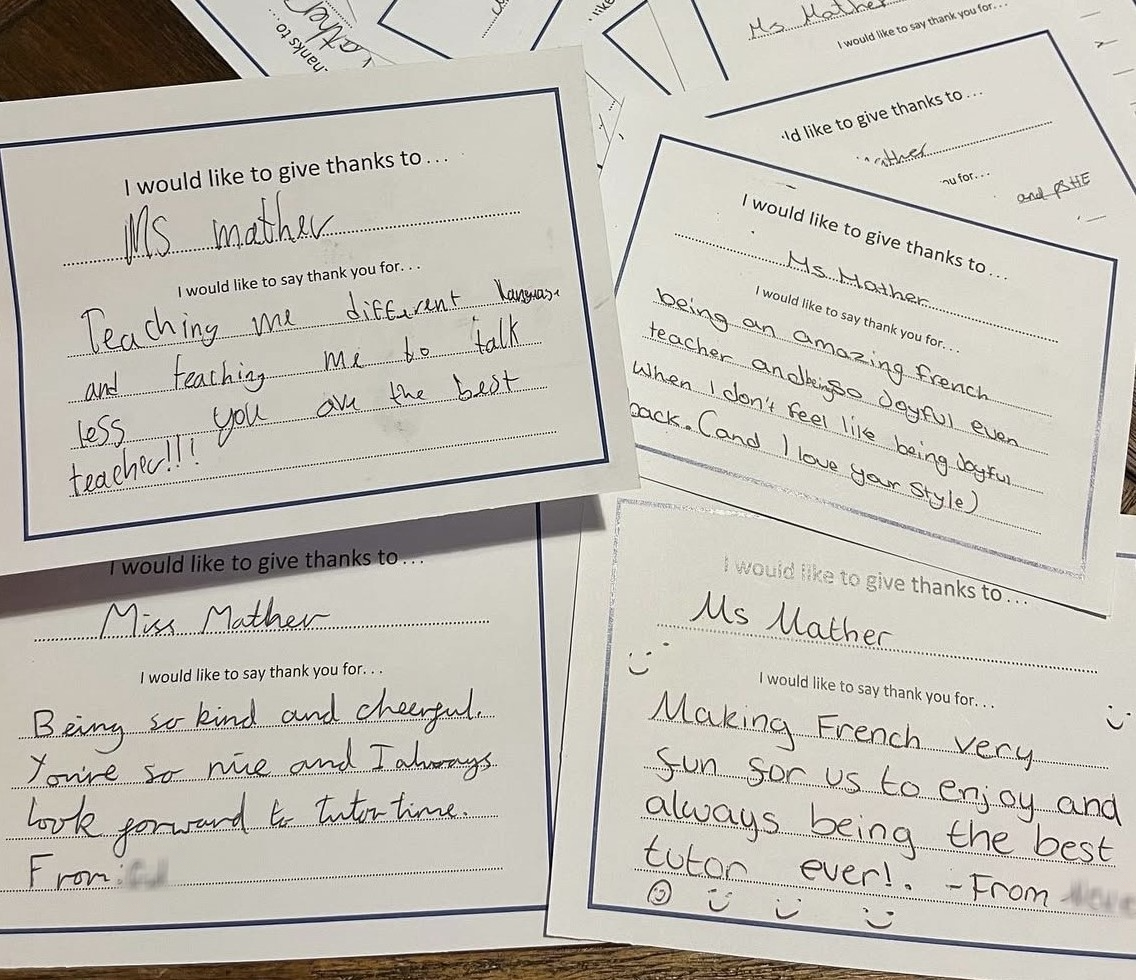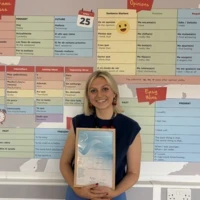Going the extra mile for children facing disadvantage
Jess found her love for teaching on our Training Programme, and is now a head of year at Sedgehill Academy in South East London. The mentoring programme she’s led has proven such a success that it is now being expanded – ensuring pupils facing disadvantage are given the best possible opportunities to succeed.
I am a French and Spanish teacher. I am also teaching PSHE and RE this year. I studied Spanish and French at university, moved to Oxford for a while and started my teaching career by tutoring refugees in English.
I was an ESOL [English for speakers of other languages] teacher working with adults and I really loved that, but I then started working a bit with children and teenagers with SEND [special educational needs and disabilities].
This helped me understand that I wanted to teach young people, so I started to look at what my options were and Teach First was recommended by a friend.
Mentoring pupils
Two years after starting the Training Programme, I’m now a head of year, and I'm also leading on pupil premium outcomes in my school, working with a member of the senior leadership team. I ran a mentoring programme last year and we're going to continue that, mentoring about 60 pupil premium children.
They'll be in groups of about four and we're splitting it into different areas of focus like academic skills, well-being and resilience.
It’s a space to set goals and to close the gap, because statistically - on a national level - pupil premium children or those facing disadvantage leave schools with fewer GCSEs or lower grades than their peers.
In terms of care, as a school we’re trying to close that gap and one of the areas where a lot of pupils go under the radar is that we don't know why they haven’t done their homework until we speak to them.
Once you give them that space, we find out that - for some of them - they're sharing a room with three siblings, and there's no Wi-Fi at home. And there's a gap. If we can identify those gaps, we can start to work out how best to support them.
When we did the mentoring last year, I just loved it. There were really positive outcomes.
I mentored a child who didn't come to school at all. I was doing everything that I could, and they've had 100% attendance so far this year.
So, we can see that it does work.
We can't see direct progress in terms of how this will affect his learning, but we know that being in school is going to be the first step. The family’s been so grateful about it and it feels really nice.
Roughly 40% of our children are on pupil premium and have been eligible for free school meals in the last five years.
My experience on the Teach First Training Programme
I love the academic side of Teach First as well. I struggled a lot at university - I did well in the end based off my skill with languages, but I was never really good at the essay writing bit.
I have really thrived in the Teach First programme.
I've had such positive feedback and was recommended to go on and do the master’s degree.
Starting the programme was overwhelming. To be honest, it is tough. It's a lot to take in. You are dealing with children who look at you and see a new teacher and you're dealing with a new curriculum and everything. But I had an amazing mentor at school, and my Personal Development Lead (PDL) was really active and present.
I had a lot of support – it's tough, but it's worth it in the end.
The early days of teaching
The first lesson I taught was so overwhelming. But the pupils from that class are now my “Velcro” pupils who, if you're on duty, will want to talk.
Now they are in Year 10 we have incredible relationships and I've seen them the whole way through.
Support through adversity
I have three chronic illnesses and that’s been a bit of a whirlwind, not something that you ever expect to really happen. It's been a difficult time for me to navigate and the physical side of it was really overwhelming.
The school has completely supported me in all kinds of ways. I've got reasonable adjustments in place; they meet my needs by having a chair by my white board so I sit down if I need to – my illness relates to standing and the kids are aware as the school are open about it.
Becoming a head of year

Just a few of the thank-you notes Jess has received from pupils – daily reminders of her impact.
Now I’m a head of year. It's lovely because my co-head of year (who also trained through Teach First) and I are good friends and similar in our approach to behaviour standards and expectations. It's been such a seamless transition.
As a head of year, the year group knows me a lot better – it feels like we're the mum and dad of 180 children and they're really flourishing.
It requires a lot of work and time. But it's so rewarding and I don't regret it at all. Everyone says you're working so hard, but the positives still by far outweigh the negatives.
Making special connections
There’s one pupil that will always have a place in my heart – a Year 11 child I taught last year. One day after class he stayed behind and wouldn't move. He was very quiet and upset.
I took the time to speak to him and from there our relationship really started to flourish and grow. He and his friends would come every single lunch and use my classroom. He got that daily check-in with me. They were such a tricky year group who wouldn't go to any of their Saturday interventions – but he was here. And after his friends also started coming to the interventions.
On my birthday, the boys got me a Celtic football top, and this boy’s mum wrote to me saying she felt that he'd lost his spark, but he got it back thanks to me.
I think everyday interactions with pupils are so rewarding and they're often hilarious.
Focusing on the positives
I think you cannot have a consistently bad day when you work in this profession.
As a teacher you can have an off moment, but you try to forget about it because you know you’re going to go on and have a positive interaction. Like when the pupils are writing notes for our kindness tree and one of them says, “I want to say thanks to Miss Mather because she always checks that everyone is OK and for working so hard to help us all”.
Advice for future trainees
I took a long time to get to who I am as a teacher, and my teacher persona was very different. My advice would be to trust the process, and trust that it will get better.
For a while I didn't see myself staying as a teacher, but you need to persevere and soak up those positive moments by giving yourself visual reminders.
Now I have all my thank you cards around me so that I just need to look around to see why I'm doing this.
Pearson Teaching National Award nomination
I got the Pearson National Teaching Award nomination on National Thank a Teacher Day at the end of last year – I received a certificate and I was in the highly commended category.
We had an end of term celebration. It was lovely because there was a pupil who went up on stage and gave a really lovely speech. And I was obviously in tears. It was a nice moment, and I've now got the certificate on display in my classroom.
Like Jess, are you passionate about improving the lives of disadvantaged children?
